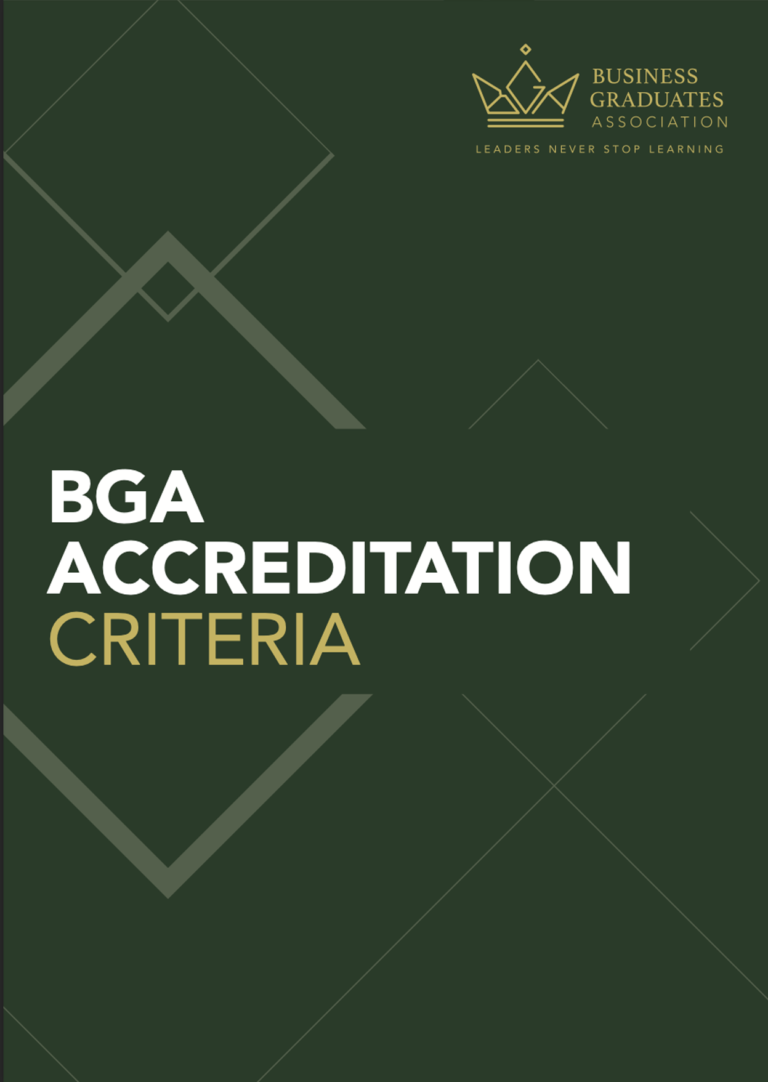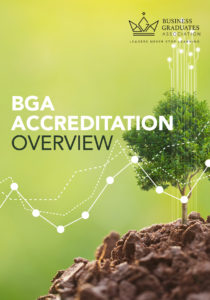BGA accreditation is designed to provide impact-driven quality assurance and quality enhancement mechanisms for institutions worldwide, in order to ensure the value of the qualification for potential students, graduates, employers and society. Accreditation plays a key role in informing prospective students and employers about the quality of the institution and its programmes.
BGA accreditation criteria are used as a benchmark for assessing the overall quality of an institution. BGA accreditation recognises the need to compare international standards while taking into consideration local legislative and cultural differences. Where the institution and its programmes are of genuine international quality, with career outcomes demonstrably equivalent to those seen at other accredited institutions, the BGA Accreditation Board (BAB) may apply compassionate consideration in awarding accreditation on a case-by-case basis.
The business school accreditation criteria are based upon the BGA Charter, and outline the standards that institutions are expected to meet, in order to be awarded accredited status by BGA. The criteria will be used to inform recommendations of accreditation by the peer review team (PRT), and the award of accreditation by the BAB. They are intended to be used holistically to assess the overall quality and values of an institution, rather than adopting a tick-box approach.

Core principles of BGA accreditation
Rationale
BGA’s rigorous assessment criteria ensure that only institutions that can fully demonstrate their quality are accredited. BGA’s accreditation is focused on measuring changes in impact, developing feedback loops, and applying feedback to improve against BGA’s accreditation criteria. This consultative, in-depth and detailed approach means that accredited business schools guarantee the highest standards of teaching and learning.
BGA believes that institutions should demonstrate best industry practice and understand changing trends to
innovate and continuously meet market demands. The BGA accreditation process reflects this commitment to
fostering innovation and challenges institutions to continuously perform at the highest level.


Guiding principles
The business education accreditation process provides stakeholders (such as potential students and employers) with a quality indicator so that they can make informed choices and decisions. BGA represents its stakeholders by ensuring that BGA only accredits institutions that demonstrate current best practices in business and management education. This includes a clear grasp on responsible management impact, coverage of relevant syllabus topics, and a provision of support for students and alumni which enhance the overall learning experience.
As a registered charity, accreditation also facilitates BGA’s work to improve standards in business education and share best practices with emerging markets and developing business schools. BGA’s experienced peer review teams, thought leadership and research, and representation of the business education sector all contribute to achieving this.
The accreditation process examines and consults the institution, where it receives recommendations in terms of programme and curriculum design, methods of teaching and delivery, alumni services, admissions strategies, and much more.
The BGA accreditation criteria is overseen by the BGA Accreditation Board (BAB) which is formed of deans and senior academics from AMBA & BGA’s global network of accredited business schools. Relevance and consistency are key to the business education accreditation process.

Eligibility
To be eligible for BGA accreditation, business schools must:
The business school has consistently operated for a minimum of five years.
The business school holds degree-granting authority. (Institutions without degree-awarding authority must request a recommendation letter from an institution accredited by AMBA or BGA.)
The institution should have successfully graduated a minimum of three student cohorts from one of its degree programs.
The institution is required to provide audited financial statements demonstrating its long-term financial sustainability.
Institutions are not required to have BGA validation to apply for accreditation, but this interim phase is designed to assist institutions in their path toward achieving successful accreditation.

BGA accreditation is focused on positive impact, responsible management, and lifelong learning
Are you interested in applying for BGA accreditation?
To obtain further details about BGA accreditation, kindly indicate your interest by completing the registration process to access the BGA accreditation brochure.

